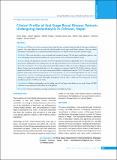Please use this identifier to cite or link to this item:
https://hdl.handle.net/20.500.14356/1139| Title: | Clinical Profile of End Stage Renal Disease Patients Undergoing Hemodialysis in Chitwan, Nepal |
| Authors: | Nepal, Richa Sapkota, Kalyan Paudel, Mahesh Sah, Kamlesh Kumar Adhikari, Bishow Nath Bajgain, Sharmila Khanal, Nimesh |
| Citation: | NepalR., SapkotaK., PaudelM., SahK. K., AdhikariB. N., BajgainS., & KhanalN. (2021). Clinical Profile of End Stage Renal Disease Patients Undergoing Hemodialysis in Chitwan, Nepal. Journal of Nepal Health Research Council, 19(03), 467-473. https://doi.org/10.33314/jnhrc.v19i3.3531 |
| Issue Date: | 2021 |
| Publisher: | Nepal Health Research Council |
| Article Type: | Original Article |
| Keywords: | Chronic renal failure end stage renal disease hemodialysis Nepal |
| Series/Report no.: | July-Sep, 2021;3531 |
| Abstract: | Abstract Background: There are very few researches from Nepal that have evaluated clinical profile of end stage renal disease patients. Our main objective was to study the clinical profile of end stage renal disease patients, who were under maintenance hemodialysis for at least three months duration in two dialysis centers located in Chitwan Nepal. Methods: This was a descriptive, cross-sectional study conducted among 138 end stage renal disease patients, who were undergoing maintenance hemodialysis at two government centers located in Chitwan, Nepal. Results: Among 138 patients in our study, 42 (30.4%) patients had diabetic nephropathy and 11 (8%) patients had hypertensive nephropathy as the leading causes of end stage renal disease; however the cause could not be ascertained in 63 (45.7%) patients. 47 (34.1%) patients had started hemodialysis within one month of diagnosis of their kidney disease. Fatigue and musculoskeletal pain were the commonest symptoms found in 78 (56.6%) patients, whereas hypotension and fever were the two most common intra-dialytic complications found in 73 (52.9%) and 61 (44.2%) patients respectively. Anemia was present in 127 (92%) patients, 41 (29.7%) had hyperkalemia, 54 (39.1%) had hypocalcemia, 116 (84.1%) had hyperphosphatemia and 43 (31.2%) had hyperuricemia. Regular use of erythropoietin analogs was significantly associated with higher hemoglobin levels (p value- 0.000) and lesser frequency of blood transfusions (p value- 0.000) in our study. Conclusions: Diabetic nephropathy was the leading cause of end stage renal disease in our study. Cause of ESRD could not be ascertained in nearly half of the total patients. Keywords: Chronic renal failure; end stage renal disease; hemodialysis; Nepal |
| Description: | Original Article |
| URI: | http://103.69.126.140:8080/handle/20.500.14356/1139 |
| ISSN: | Print ISSN: 1727-5482; Online ISSN: 1999-6217 |
| Appears in Collections: | Vol. 19 No. 03 (2021): Vol 19 No 3 Issue 52 Jul-Sep 2021 |
Files in This Item:
| File | Description | Size | Format | |
|---|---|---|---|---|
| 3531-Article Text-25060-1-10-20211215.pdf | Fulltext Download | 297.4 kB | Adobe PDF |  View/Open |
Items in DSpace are protected by copyright, with all rights reserved, unless otherwise indicated.
